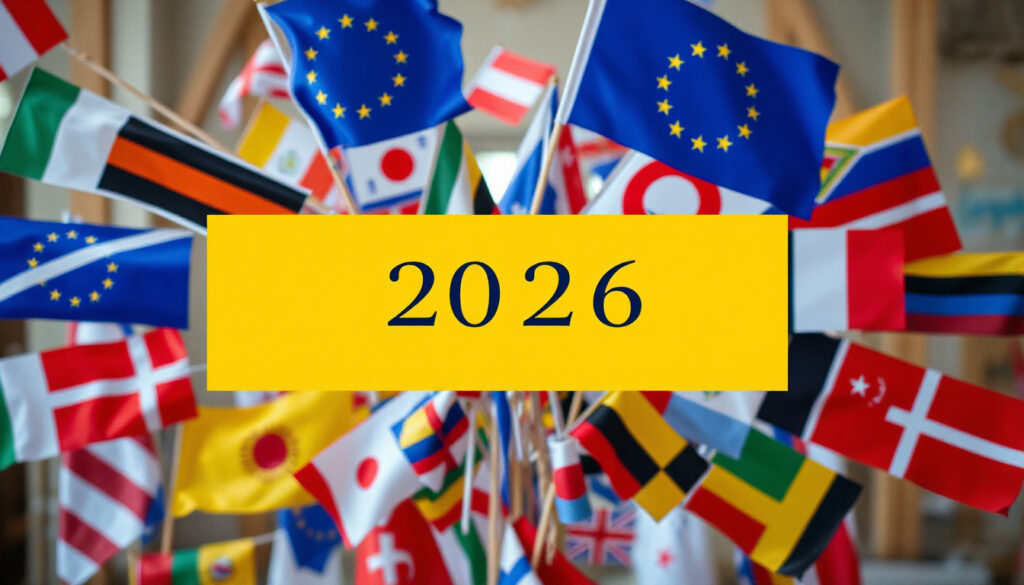Decoding Eurovision 2026: A Bold Look at Voting Blocs
Eurovision Song Contest will happen in Vienna in 2026. The show gives us bright songs and lively acts. It also shows a network of votes linked to deep political and cultural ties in Europe. We see that ties between words matter. The shorter the link between them, the easier they are to understand. This analysis helps us see how alliances and splits occur, especially now when Israel’s role is under debate.

Why Voting Blocs Matter in Eurovision 2026
Eurovision is more than a music show. It also acts as a sign of global ties and cultural pride. Votes reveal past bonds, political disputes, and shared regional roots. In 2026, many eyes watch the contest as political weight grows. The country Israel faces strong challenges.
Here is why the voting groups draw our attention:
- Votes give clear hints about support or opposition tied to today’s issues.
- Neighbors send high points to one another because of shared language and culture.
- Some countries withhold points or do not vote to show their disapproval.
- The public vote and official vote sometimes move in different directions.
These points help fans and experts guess the contest’s end and see wider trends across Europe.
Key Themes Influencing Eurovision 2026 Voting Blocs
1. The Israel Participation Debate
Israel’s entry in Eurovision 2026 has become a hot issue. Many broadcasters in Europe use strong words against Israel because of disputes linked to the Israel-Gaza conflict.
- Broadcasters in Spain, Ireland, and the Netherlands say they oppose Israel’s entry.
- The EBU holds an online vote to decide if Israel will take part.
- Austria’s broadcaster, ORF, says the show will go on. It shows strength while it feels the strain.
This scene changes voting groups:
- Some countries may give fewer points to Israel.
- Countries tied to Israel may pool their votes to show support.
- Public votes might look different from those made by expert panels.
2. Regional Voting Patterns and Old Alliances
Votes often show familiar regional teams. Neighbors tend to give each other high marks. These groups include:
- The Nordic group: Sweden, Norway, Denmark, Finland, Iceland.
- The Balkan group: Serbia, Croatia, Bosnia, North Macedonia.
- The Eastern group: Ukraine, Poland, and others.
- The Western group: UK, Ireland, France.
Past contests show these patterns. Yet recent events have changed some habits. For example:
- Russia was removed in 2022 because of events in Ukraine. This broke an old Eastern pattern.
- Neighbors have changed how they vote after political disputes.
For 2026, watch to see:
- If old groups hold together or break apart.
- If new ties form from shared cultural events or mutual support.
3. Public and Jury Voting Differences
Eurovision votes come from both expert juries and the public by phone. This split can show different priorities:
- Experts focus on the song, stage show, and skill.
- The public may vote with their hearts or from political views.
Recent years show:
- Jury marks tend to smooth out group biases.
- Public votes often stick to regional loyalties or political feelings.
In 2026, you may see:
- Bigger gaps between jury choices and public calls.
- Expert voters trying to balance out strong public reactions.
4. Impact of Protest Actions and Cultural Boycotts
Protests in support of Palestine have grown in recent Eurovision shows, especially when Israel took part in 2024 and 2025. – These acts stir up tension in the host country and among voters.
- Calls to skip or reduce points lead to debates about fairness.
- Some artists and groups speak out either for or against these views, which can shift public votes.
These actions may:
- Change how countries choose to vote.
- Lead to votes of no mark or silent scoring.
- Influence how the contest is hosted and promoted.
5. How Europe’s Political Mood Affects Voting
Eurovision votes also mirror political moods in Europe. They show issues like:
- Debates about immigration and national pride.
- Different views on democracy and human rights.
- Efforts at cultural talks that try to go beyond politics.
The 2026 contest stands as a stage where these currents show by how votes connect. The votes, public views, and media talk all work as clues.
What This Means for Eurovision Fans and Analysts
When you watch Eurovision 2026 or study its results:
- Look beyond the points. Each one hints at a country’s current leanings.
- Think about both the expert and public votes to see a full picture.
- Notice if old voting groups change—especially with the Israel debate.
- Keep an eye on the host country, Austria, as it works through these issues.
- See that Eurovision goes beyond music. It shows Europe’s mix of views and emotions.
Practical Takeaways from Eurovision 2026 Voting Bloc Analysis
For fans, commentators, or those who study these trends:
- Follow the vote counts as they happen. This helps find new or shifting groups.
- Check social media and news to get a feel for public mood.
- Read EBU news and broadcaster comments for clues about future votes.
- Watch how political events shift a cultural show.
- Stay open to surprises as groups react to the current political scene.
Final Thoughts: Enjoying Eurovision 2026 Beyond the Music
Eurovision 2026 brings songs and acts we expect to see. It also acts as a window into how Europe shows support and splits. The votes tell us more than just the next winner. They show us why countries send their support or their protests on this stage.
If you root for your country, study the votes for clues, or simply enjoy watching a unique mix of culture and politics, you will find that Eurovision is a true mirror of Europe today.
Explore more on Europe’s changing scene and vote habits as we near the EBU vote in November and the journey to Vienna 2026 continues.







